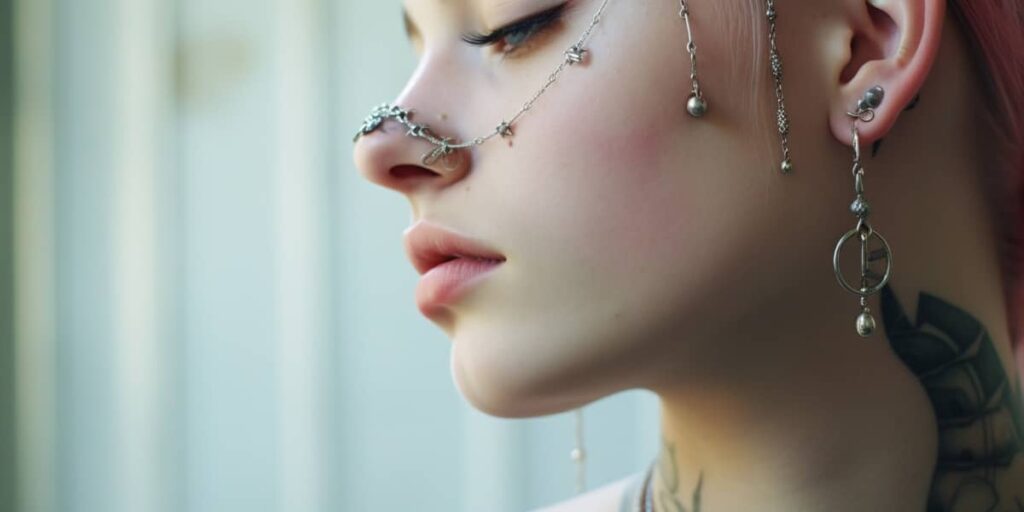In the vast world of weight loss methods, there’s a unique and intriguing option that’s been gaining traction – weight loss piercings for anxiety. You might be wondering, how does this even work? Well, I’m here to shed some light on this fascinating topic.
The principle behind weight loss piercing is rooted in the ancient practice of acupuncture. Certain points on your body, when stimulated through piercing, can help regulate appetite and alleviate anxiety – two key factors that contribute to weight gain. It’s not a magic bullet solution, but it could potentially aid your overall weight loss journey if paired with healthy lifestyle changes.
Now, let’s dive deeper into how these little pieces of jewelry could possibly make such an impact on our bodies and minds. From understanding their origins in traditional Chinese medicine to examining the scientific evidence supporting (or disputing) their effectiveness – we’ll explore it all.
Understanding Weight Loss Piercings
I’ve often heard inquiries about weight loss piercings. It’s a topic that raises eyebrows as much as it sparks interest. So, let’s dive right in.
Weight loss piercings, also known as acupuncture or acupressure earrings, have been gaining traction recently. The concept is rooted in the millennia-old practice of acupuncture. Traditional Chinese Medicine believes that specific points on the body can be stimulated to restore balance and influence health outcomes. Let me tell you more about these intriguing pieces of jewelry.
Most weight loss earrings target a particular point on the ear called “Shen Men” or “Heavenly Gate”. This pressure point is believed to manage stress, anxiety and help with overall well-being – factors that can indirectly contribute to weight management.
However, I must emphasize that science has yet to validate these claims conclusively. While some people swear by their effectiveness, others don’t see any noticeable changes beyond the placebo effect.
Here are some important facts:
- Weight loss piercings work on the principle of acupressure.
- The most targeted point for these earrings is Shen Men.
- Their effectiveness remains scientifically unverified.
You’ll find numerous personal anecdotes online from individuals who’ve tried this method with varying levels of success. But remember: what works for one person may not work for another due to our unique biological makeup and lifestyle habits.
In a nutshell? Weight loss piercings may offer an additional tool in your arsenal against extra pounds but should never replace healthy eating and regular exercise.
How Anxiety Affects Weight Gain
I’ve often heard people express concern over unexpected weight gain. They’re eating healthy, they’re exercising regularly, but the scale just keeps creeping up. What they may not realize is that there’s a hidden culprit lurking in the shadows: anxiety.
It’s no secret that our emotional state can have a huge impact on our physical health. When we’re stressed or anxious, our bodies respond by releasing stress hormones like cortisol. This isn’t necessarily bad—in fact, it’s a survival mechanism designed to help us deal with threats. However, when this state of high alert becomes chronic, it can lead to a host of issues including unwanted weight gain.
Here’s how it works: cortisol triggers your body to store fat as a sort of energy reserve for future emergencies. It also stimulates cravings for high-fat and sugary foods—those ‘comfort foods’ we often turn to when we’re feeling down or stressed out.
To illustrate my point further, let me share some revealing statistics:
- According to the American Psychological Association (APA), about two-thirds of Americans say they eat more when they’re feeling stressed.
- The APA also found that nearly half of Americans report lying awake at night due to stress—a factor which can contribute significantly to weight gain.
Table 1: Stress-related behaviors reported by Americans
| Behavior | Percentage |
|---|---|
| Eating more | 66% |
| Lying awake at night | 47% |
Unfortunately for those struggling with anxiety disorders and chronic stress conditions, these hormonal changes and behavioral responses aren’t just occasional occurrences—they’re an everyday reality.
So what does this mean for you? Well, if you’re finding it difficult to shift those extra pounds despite your best efforts in dieting and exercising—it might be worth considering whether anxiety could be playing a part in your weight journey. After all, understanding the problem is always the first step towards finding a solution.
The Science Behind Piercings for Anxiety Relief
I’ve been delving into the world of alternative therapies recently, and one technique that caught my attention is anxiety relief through piercing. Yes, you heard it right! A simple ear piercing might just be the non-medical solution to anxiety we’ve all been waiting for.
This intriguing concept is based on acupuncture, an age-old Chinese practice. It hinges on the belief that specific points in our body can regulate energy flow or ‘Qi’. When this energy gets blocked, it leads to physical or mental health issues like anxiety. Acupuncturists insert needles at these points to unblock this energy.
Here’s where things get interesting: a type of ear piercing known as Daith piercing targets an acupressure point within your ear that’s believed to influence anxiety levels. By wearing a small ring or stud in this area, it’s thought that you can stimulate this point daily and thereby reduce anxiety symptoms.
But don’t just take my word for it. Let’s take a look at some numbers:
| Year | Study | Outcome |
|---|---|---|
| 2017 | Review of 16 Clinical Trials (World Journal of Acupuncture) | Found evidence suggesting acupuncture may have a positive effect on reducing stress and anxiety |
However, I must emphasize – while many individuals swear by their Daith piercings for managing their own anxieties, scientific research in this realm remains limited. This doesn’t mean there isn’t potential; rather more studies with larger sample sizes are needed to definitively prove its effectiveness.
Also worth noting are the potential risks involved in getting any kind of piercing such as infection or allergic reactions. Therefore if you’re considering a Daith piercing for its alleged anti-anxiety benefits:
- Always consult with knowledgeable professionals
- Maintain good hygiene post-piercing
- Monitor closely for any signs of complications
In conclusion (without actually concluding), while the science behind anxiety relief through piercing is intriguing, it’s still a field that warrants further exploration. As always, I encourage you to approach alternate therapies with an open but informed mind.
Types of Weight Loss Piercings and How They Work
I’ve been diving deep into the world of weight loss piercings lately, a fascinating alternative method that’s gaining popularity. It’s all about stimulating specific points on your body to control anxiety and manage weight. Intriguing, right? Let me introduce you to two main types: ear seeds and daith piercings.
Ear seeds, also known as auriculotherapy, are tiny metal balls typically made of gold or silver. They’re placed on pressure points in your ear – think acupuncture but without the needles. The idea is these tiny seeds stimulate those points continuously, helping regulate food cravings and anxiety levels. While it may sound unconventional, there’s a growing body of anecdotal evidence supporting its effectiveness.
Daith piercings are another type targeting a specific point in your ear – the innermost cartilage fold. Proponents believe this piercing can help manage migraines and potentially control appetite too. This is based on the same principles as acupuncture; by placing a piercing at this strategic location, it’s thought to maintain constant stimulation which could alleviate symptoms associated with overeating and stress.
Now you might be wondering how exactly do they work? Here’s what researchers suggest: these piercings potentially influence our vagus nerve—an essential part of our nervous system responsible for various functions including digestion and mood regulation. By stimulating certain areas connected to this nerve through these piercings, it might improve digestive function and control anxiety—a double whammy when tackling weight loss!
However, keep in mind that results vary from person to person—what works for one may not work for another. Also important to note is that while some find success with these methods alone, they’re often more effective when combined with other healthy lifestyle changes like diet or exercise.
So there you have it—the basics of weight loss piercings! A blend of traditional Chinese medicine concepts with a modern twist. It’s no magic bullet, but it could potentially be another tool in your weight loss arsenal.
Benefits and Risks of Weight Loss Piercings
Before making the leap into the world of weight loss piercings, it’s crucial to understand both their potential benefits and risks.
Starting with the positives, one of the main reasons people turn to weight loss piercings is due to their reported help in managing anxiety. The logic behind this draws from acupuncture principles. It’s believed that certain points on the ear correspond with various body parts and systems. By stimulating these points through piercing, it could trigger a response in your body that helps control anxiety levels.
Another potential benefit could be an improvement in digestion. The theory suggests that stimulation at specific points on your ear may enhance your digestive system function, leading to more effective food processing and potentially aiding weight loss.
But let’s not forget about the other side of the coin – no treatment comes without its risks or drawbacks. With weight loss piercings, there’s always a risk of infection or allergic reaction to metals used in jewelry.
The effectiveness of these piercings also remains largely anecdotal at this point, with scientific research yet to fully support these claims. Therefore, while some individuals might swear by their effects, others may find little to no change after getting pierced.
Lastly, it’s important I stress how essential professional guidance is when considering any form of treatment like this for anxiety or weight management purposes. Always consult with a trusted health professional before making such decisions – they’ll provide you with personalized advice based on your unique circumstances.
To summarize:
Benefits:
- Potential anxiety relief
- Possible improved digestion
Risks:
- Risk of infection or allergic reactions
- Effectiveness not scientifically proven
Remember folks – knowledge is power! Stay informed about all aspects before going down any particular path towards health improvement.
Real-Life Experiences: Stories of People Using Piercings for Anxiety and Weight Loss
I’ve heard countless stories about the impact that weight loss piercings have had on people’s lives. One woman, let’s call her Lisa, shared that she was always a bit skeptical about alternative therapies. However, after suffering from chronic anxiety and struggling with weight issues, she decided to give it a shot.
Lisa got the daith piercing (a specific type of ear piercing) and reported noticeable changes in her anxiety levels within weeks. She said, “It was as if a weight had been lifted off my shoulders. I still experienced some bouts of anxiety, but they were less intense and more manageable.” Moreover, Lisa found herself less prone to stress eating which led to gradual but consistent weight loss.
Talking about numbers – here’s an interesting statistic. A survey conducted by ‘Piercing Emporium’ revealed that approximately 47% of their customers reported improvements in their mental health post getting daith piercings.
| Survey Result | Percentage |
|---|---|
| Improved | 47% |
| No Change | 53% |
Another case is John who battled obesity for years before stumbling upon the idea of body piercings for weight loss. He opted for a tongue piercing – based on the belief it would reduce his appetite due to discomfort while eating. To his surprise and delight, he lost over 30 pounds within six months.
- John Before: 250 lbs
- John After: 220 lbs
John’s experience isn’t unique though! There are numerous forums online where individuals share their success stories using body piercings as a tool for weight management.
However, I’ll emphasize this point again – everyone’s experience with these methods will be different because our bodies are unique. While some find great success like Lisa or John did; others may not notice any significant changes. Always consult with a knowledgeable healthcare provider before making such decisions, and remember that piercings should be just one part of a comprehensive weight loss plan.
Keep in mind, these stories aren’t meant to make outlandish promises or provide an easy solution to complex health issues like anxiety and obesity. They’re simply personal experiences shared by individuals who’ve journeyed down this less-traveled path.
Professional Advice on Using Piercing as a Tool for Anxiety and Weight Management
Let me share some pro insights on this intriguing topic. It’s been noted that specific body piercings, particularly in the ear, might assist with stress management and weight loss. This is primarily due to their connection with acupuncture, an ancient Chinese medicine technique.
Acupuncturists believe there’s a point in your ear known as the Shen Men or “Heavenly Gate.” When pierced, it’s suggested this spot can help reduce anxiety levels. The theory goes that when you’re less stressed, you’re less likely to indulge in emotional eating or other unhealthy behaviors linked to weight gain.
Here are a few key points:
- Ear piercing isn’t a magic bullet: While it may aid in managing anxiety and potentially support weight loss efforts, it should not be viewed as a standalone solution.
- Always seek professional advice: If you decide to go ahead with this approach, ensure that the procedure is performed by a certified professional who follows all safety guidelines.
- Maintain healthy habits: Even if you find ear piercing helpful for anxiety relief, remember it’s just one part of maintaining overall well-being.
Now let’s look at some data:
| Year | Number of People Trying Acupuncture-related Procedures |
|---|---|
| 2015 | 3.5 million |
| 2020 | 6 million |
The numbers reveal an increasing interest in alternative practices like acupuncture and related procedures over recent years. But remember these figures aren’t solely about piercing for anxiety or weight management – they include all types of acupuncture-related treatments.
To end this section on a practical note – yes, trying something new like body piercing might help manage your anxieties and contribute towards healthier lifestyle choices. But always consult healthcare professionals before embarking on such decisions because everyone’s health situation is unique!
Conclusion: Are Weight Loss Piercings for Anxiety Effective?
By now, you’re probably wondering if weight loss piercings for anxiety truly work. I’ve delved deep into this topic, and the answer isn’t as straightforward as a simple yes or no.
Some people swear by these piercings, claiming they’ve experienced significant weight loss and reduced anxiety levels. Yet scientific evidence to back up these claims is sparse at best. It’s important to remember that everyone’s body reacts differently to treatments like this.
Let’s not forget that weight loss is typically associated with diet and exercise changes. If you’re considering getting a piercing in hopes of losing weight or easing your anxiety, it might be beneficial alongside a healthy lifestyle change.
It boils down to personal belief and anecdotal evidence when it comes to the effectiveness of weight loss piercings for anxiety. Some find them helpful while others don’t notice any difference at all.
- There are many who laud their effectiveness
- A substantial number claim no noticeable benefit
- Few studies support the efficacy claims
In my opinion, there’s no harm in trying if you’re curious about it – provided you get it done by a professional and follow proper aftercare instructions.
Just remember, there’s no quick fix when it comes to health issues like obesity or anxiety disorders. Lifestyle changes such as improved diet, regular physical activity, stress management techniques and consulting healthcare professionals should always be your first line of action.
So are they effective? The jury is still out on this one but considering everything we’ve discussed so far, I’d say proceed with caution. They could be just another fad that fizzles out over time or perhaps they do hold some merit – only time will tell!



